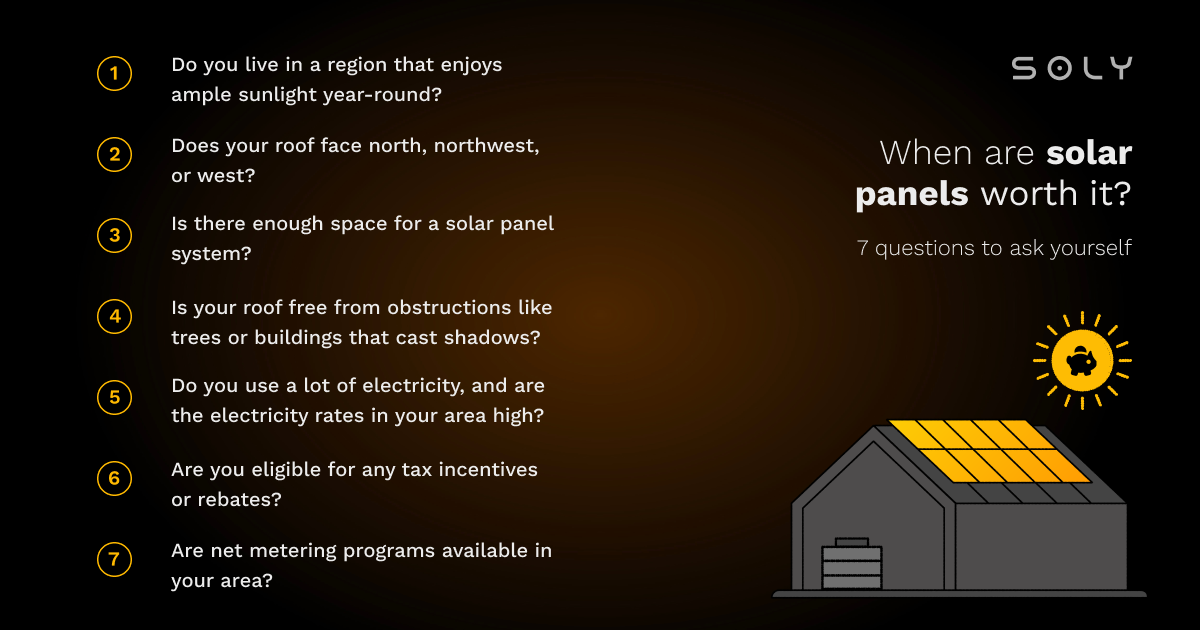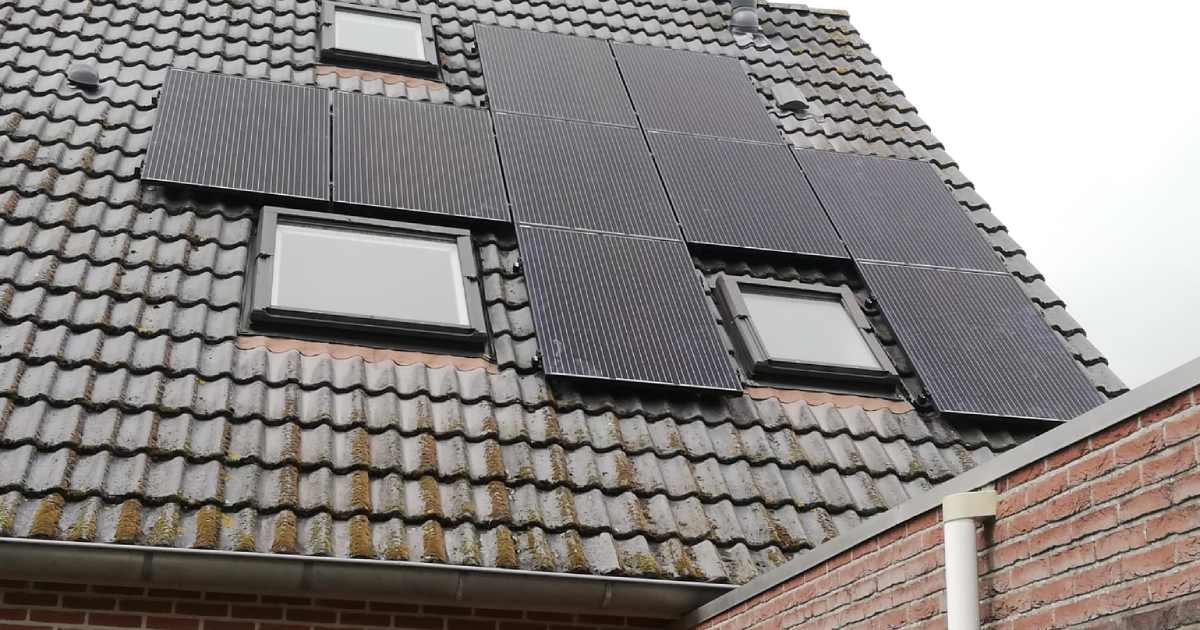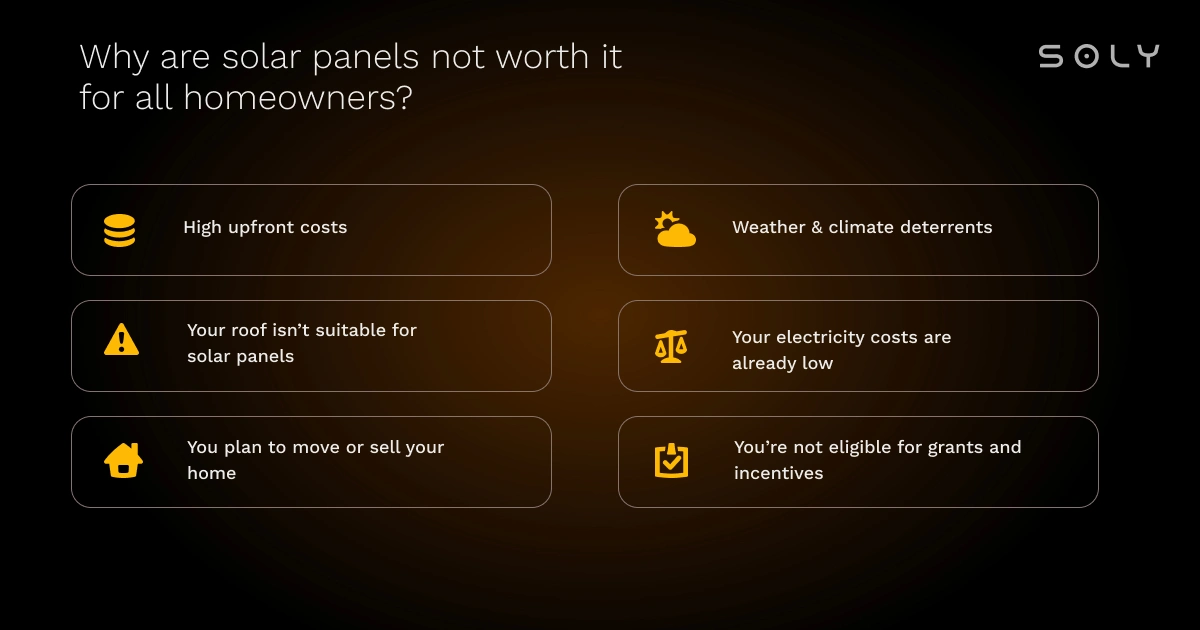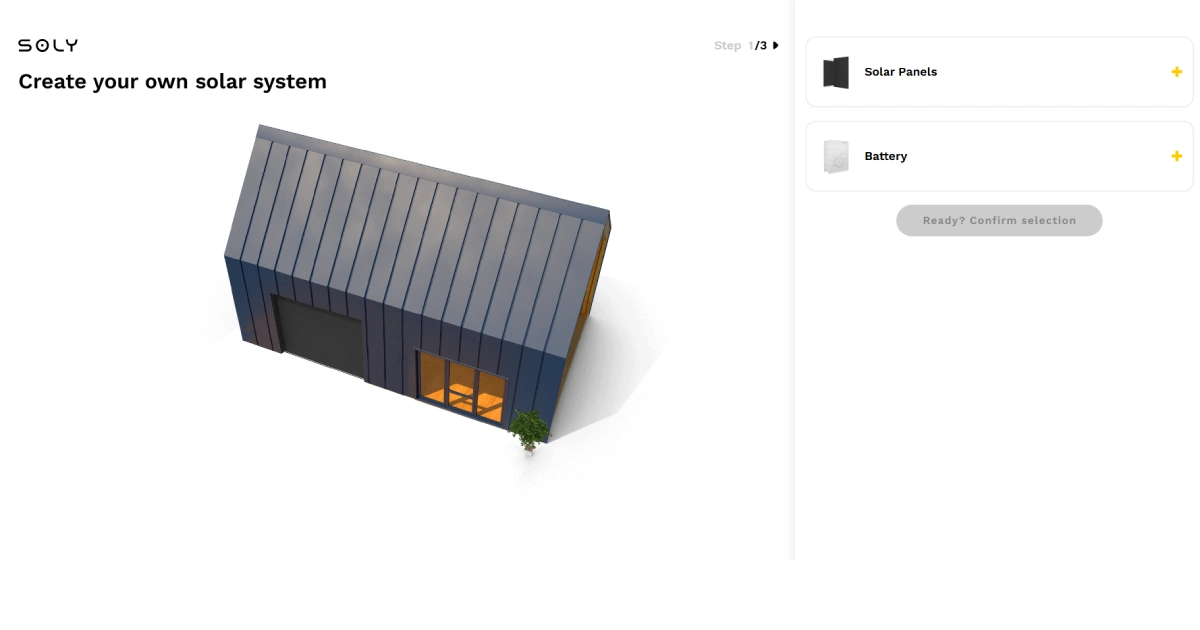Are solar panels worth it or not? A balanced review of the true costs and savings
Are solar panels a good investment? With energy prices climbing in South Africa and environmental concerns on the rise, many are asking if switching to solar power is a smart financial move. If you’ve been pondering whether solar panels are worth the cost, you’re not alone.
The decision to install solar panels involves weighing up several factors, including the upfront investment, potential savings, and long-term benefits. To help you navigate this choice, it’s essential to understand the pros and cons of solar panels. Are they truly a cost-effective solution, or just a passing trend?
On this page, you’ll learn:
- A detailed look at whether solar panels are worth it or not to help you assess their value.
- The financial advantages of solar panels, including savings on your energy bill and available incentives.
- How to determine if solar panels are a good fit for your specific situation and goals.
By the end of this page, you’ll have a clearer picture of whether solar panels are a worthwhile investment for you.
Let’s dive into the details!
When are solar panels worth it?

If you’re still stuck in limbo wondering whether or not solar panels are truly worth the investment, considering the following factors can help you make your decision:
1. The more sunlight your location receives, the better
- Do you live in a region that enjoys ample sunlight year-round?
Location matters to some extent when it comes to the performance of solar panels.
South Africa is one of the sunniest countries in the world, with most regions enjoying an abundance of sunlight throughout the year. According to the South African Department of Energy, the majority of areas in South Africa enjoy over 2,500 hours of annual sunshine, with solar radiation levels averaging between 4.5 and 6.5 kWh/m2 per day.
Cities like Johannesburg, Pretoria, Durban, and Cape Town experience high levels of solar radiation, meaning that solar panels can produce significant amounts of energy throughout the year. Even regions with cloudier weather (such as parts of the Western Cape) still see good returns on solar panel investments, due to the savings on electricity costs and reduced reliance on Eskom’s grid.
In cloudier regions it could take a bit longer for you to break even on your investment, but ultimately, despite some variations, South African regions’ year-round sunshine means there is huge solar energy potential to be harnessed.
2. Your roof’s characteristics, combined with a well-planned solar panel installation by a professional, positively impact the efficiency of your solar setup
- Orientation: Does your roof face north, northwest, or west?
- Space: Is there enough space for a solar panel system?
- Shade: Is your roof free from obstructions like trees or buildings that cast shadows?

Your roof actually plays an important role in determining whether or not solar panels are a good investment. Solar panels tend to work best on north-facing roofs in South Africa. This is because they get the most direct sunlight throughout the day.
A roof with a tilt of 15 to 40 degrees is also ideal as it will allow for optimal solar energy absorption. However, if you’re wondering where to install solar panels, don’t count yourself short if your roof faces east or west, you can still install solar panels, though they may be slightly less efficient.
Additionally, shaded roofs, resulting from nearby buildings, trees, or structures will further affect the effectiveness of the system. In cases where shading is an issue, additional installations, such as angled mounting or inverters can help to optimise energy generation, although this might increase the overall cost. Microinverters can be especially useful, as they allow each panel to operate independently, which ensures maximum efficiency, even if some panels are shaded.
DID YOU KNOW… Did you know that that even if your roof isn’t perfectly positioned, custom solutions do in fact exist to optimise your energy capture? You’ll just need to keep in mind that these adaptations may increase the expenses and extend the payback period.
3. The more electricity you use, the more you’ll benefit from solar panels
- Do you use a lot of electricity, and are the electricity rates in your area high?
If you live in an area where the electricity rates are expensive and have high electricity needs, you’ll save more, and the solar PV system will quickly pay for itself.
However, if your energy system is typically low, it could take a bit longer to see these savings as your bills aren’t as high to begin with. Heavy electricity users, especially daytime users, can greatly reduce their reliance on the grid and avoid the rising energy prices.
4. Government grants and schemes can lower your initial cost
- Are you eligible for any tax incentives or rebates?
In South Africa, there are various solar panel grants and funding schemes that can make solar panels more affordable to homeowners.
Available solar panel funding options
One common way that South Africans can finance switching to solar without paying the full upfront cost is through Rent to Own schemes. These schemes allow you to lease a solar system from a provider for a set amount of time, usually between 5 and 10 years. At the end of the agreed time period, you can then decide whether to buy the system for the outstanding sum or return it to the provider.
Moreover, solar systems in South Africa are VAT exempt, meaning that homeowners and businesses who make the switch to solar do not have to pay 15% VAT on their purchase. Solar suppliers in South Africa will therefore automatically not charge VAT on the solar system they are selling. This incentive is part of the government’s commitment to encourage the public to switch to green technologies and make clean energy solutions more accessible.
As well as the VAT exemption on solar products, the government has also introduced tax incentives to encourage more people to invest in renewable energy. Section 12B of the Income Tax Act allows for tax breaks on solar for businesses, as well as individuals who meet the minimum energy production requirements. These tax breaks can result in a more affordable system and significantly increase savings.
There are other options out there such as financing schemes that are offered by some panel installers. They can include loans or payment plans and help to spread the cost over the course of several years which can make the cost of solar more affordable upfront.
Additionally, there are crowdfunding or community solar programs which can be an innovative way to minimise costs.
These involve multiple households or communities coming together to share the investment in a large solar installation. This gives way for a more widespread adoption of renewable energy at lower individual costs.
5. Net metering turns excess solar energy into profit
- Are net metering programs available in your area?
Net metering allows you to earn extra credits or receive financial payouts based on the excess energy your system produces. This means that any extra electricity your panels generate can be sold back to the grid.
The more energy you use can help you recoup your costs faster. In areas with net metering, this feature truly boosts your overall savings by turning your solar system into a money-saving and possibly money making investment.
IS IT WORTH INSTALLING SOLAR PANELS? If you answered ‘yes’ to most of these questions, solar energy is likely a great investment for you. If you’re uncertain, speaking to a solar expert can provide tailored advice based on your specific situation and renewable energy goals.
Why are solar panels not worth it for all homeowners?

Solar panels can be very advantageous for many, but they might not be the best option for everyone. Here are some reasons why they may not be suitable:
#1: High upfront costs
Undoubtedly, solar panels require a significant amount of money upfront. Although there are grants and financing options available, this initial outlay can still be a challenge for some homeowners.
This is why many installers are now offering payment plans that help spread the cost over time. That, along with the rising energy prices make solar the more cost-effective solution in the long run.
Additionally, South Africa’s zero VAT on solar installations ensures that upfront solar panel costs are lowered, which makes the initial investment much more manageable.
#2: Weather & climate deterrents
It’s true that domestic solar panels perform their very best in the sunniest conditions and that cloudy or short winter days can affect their efficiency. However, panels still produce usable electricity even on cloudy days, albeit at a lower rate and South Africa’s sunny weather makes it a prime location!
What’s great about the advancements with technology and solar is that modern panels are much more efficient and can still generate power even in low-light conditions.
This means that even in cloudier regions of South Africa, a solar panel system is producing enough energy to make a difference. What’s more, there’s still the potential to save over time, making them a viable option.
#3: Your roof isn’t suitable for solar panels
Perhaps your roof is older, or maybe you have less roof space, or even heavily shaded, and in such cases, a solar installation might not be the most ideal option. In fact, roofs that face north are typically shaded by trees or buildings tend to generate less electricity.
However, don’t lose hope! For less-than-ideal roofs, there are solutions such as using microinverters or ground-mounted solar panels to truly optimise energy production. With the right setup from an accredited solar panel installer, even shaded roofs and those with less roof space can benefit from solar.
#4: Your electricity costs are already low
If you have a small home, energy-efficient appliances, or your electric bill is already low, installing the average solar panel system might not deliver quick returns. The solar panel payback period will be longer, and the savings may take more time to accumulate.
Even if your current circumstances and bills are proven low, investing in solar energy now is the protection you need for the future.
Energy prices on electricity bills will continue to rise.
So when considering, “Are solar panels worth it?”, remember that with solar panels installed, you reduce your reliance on the grid, so that you’re less vulnerable to sudden hikes in electricity bills.
#5: You plan to move or sell your home
If you have plans to move soon, a solar energy system might not be worth the investment.
The upfront cost of solar panels can take several years to recoup, and if you leave before hitting that break-even point, you might miss out on the full benefits.
When thinking about this, it’s important to remember that adding panels to your residence increases the value of your home. Properties with solar tend to sell faster and at higher prices.
However, this is only true if the system is fully paid off. If you’re financing your solar panels through a loan, you’ll likely need to settle the remaining balance upon selling the house, which could complicate the sale.
Moreover, transferring the PV system to a new home is notoriously expensive and impractical, as solar panels are intended to remain fixed in place for their entire lifespan.
That being said, if you own the system outright, the added value and energy savings can still make your home more attractive to potential buyers.
#6: You’re not eligible for grants and incentives
The cold, hard truth about it is that not every homeowner will qualify for grants or incentives, and this alone can make the initial investment seem less attractive.
That said, even without grants homeowners who believe in their renewable goals are resilient! Many installers provide excellent solar panel financing options so that you can pay over time. Moreover, since we know that the cost of electricity will continue to soar, the panels will indeed save you money eventually, even without the initial financial support.
Explore more on solar panel grants in South Africa within our detailed guide, offering a full breakdown of available options and how you can maximise your savings.
How much do solar panels cost in South Africa?
The cost of installing panels in South Africa can vary. It’s determined on the size of the solar panel system you need. For a typical 5.5 kW solar panel system, which is usually 9 panels, you can expect to pay around R15,900 (without VAT). For larger systems, such as a 7.7 kW (14 panels), the cost is approximately R22,200 (without VAT).
Please note, all prices shown are estimated costs for SA homeowners. For a precise quote tailored to your needs, we recommend reaching out to a professional installer.
Don’t worry!
Soly is here to simplify the process and guide you every step of the way! The only thing you need to do is either contact us by email or phone, or use our online configurator to book a call with one of our consultants in the final step.
How much do solar panels save?
To quickly estimate just how much you can save with solar panels, use our soly calculator tool. This easy-to-use tool helps you calculate your potential savings based on your energy consumption, system size, and location.

Indubitably though, when installing solar panels, you can save a significant amount on your electric bills. This is especially true in regions that have higher energy rates, as mentioned. On average, homeowners save up to 80% on their energy bills, on average, depending on the size of their solar panel system and local electricity prices.
Additionally, South Africa’s current 0% VAT policy on installing solar panels makes these investments even more affordable. Right now, if you find yourself wondering, “are solar panels worth it?”, with the 0% VAT on solar panels, the savings alone at this time speak for themselves:
- Savings on 2.75 kW with Zero VAT: R1,425
- Savings on 5.5 kW with Zero VAT: R2,385
- Savings on 7.7 kW with Zero VAT: R3,330
Furthermore, when you cut your energy bills, these panels also minimise your reliance on the national grid which keeps you safe from any future rise in energy prices. Over time, the solar arrays can result in greater long-term savings all while reducing your carbon footprint.
How long does it take to break even on solar panels?
The average payback period for solar panels in South Africa is around 7 years. The ROI (return on investment) can vary as it depends on factors like system size, installation costs, and available incentives. With larger solar panels in place, you’ll find better returns. This is due to the greater energy generation and the potential for higher savings.
But that’s not always the case.
In limited-size roofs, smaller panels with higher efficiency can be selected to deliver the same levels of electricity and savings.
Additionally, making use of net metering can also reduce the payback period and help you break even. This scheme does this by generating additional income from your excess electricity generated, as mentioned earlier.
Through these incentives, you can benefit in two main ways:
- Tax rebate: Claim 25% of the cost of new and unused solar PV panels, up to a maximum of R15,000.
- Net metering (SSEG): Earn credits for excess electricity sent back to the grid, reducing your overall energy expenses.
- Total cost of solar system: R126,500
- Tax rebate (25% of panel cost): R15,000
- Net system cost: R111,500
Scenario: R2,000 Monthly Electricity Spend
- Electricity savings:
- Average Eskom electricity price: R3.50 per kWh.
- Monthly usage: R2,000 ÷ R3.50 ≈ 571 kWh.
- A 6 kW solar system can offset approximately 70% of this consumption (400 kWh).
- Monthly savings: 400 kWh × R3.50 ≈ R1,400.
- Annual savings: R1,400 × 12 = R16,800.
- Net metering income (SSEG):
- A 6 kW system can export around 100 kWh/month to the grid.
- Assuming a feed-in credit of R1.50 per kWh:
- Monthly export income: 100 × R1.50 ≈ R150.
- Annual income: R150 × 12 = R1,800.
- Electricity savings: R16,800
- Net metering (SSEG) income: R1,800
- Total: R18,600
Net system cost: R111,500 ÷ R18,600 ≈ 7 years
This example shows how solar energy, combined with rebates and net metering, can provide a realistic payback period while significantly lowering household energy costs.
After your solar panel payback time, you can continue to enjoy the reductions on your energy bill and the income you make from exporting excess energy, which makes the solar panels worth it and without a doubt, a solid long-term investment.
FAQ
Are solar panels worth getting in South Africa?
Of course. With the ongoing energy crisis, the price of electricity constantly rising and some incentives currently available, installing solar panels is an excellent investment. They aim to lower your electricity bills, minimise your reliance on the grid, and can increase the value of your home. Furthermore, the environmental benefits make them quite significant.
How to calculate if solar panels are worth it?
It’s easy to calculate whether or not panels are the right fit for you!
Simply use an online solar calculator like the one from Soly! You’ll need to factor in your energy usage, the orientation and shading of your roof, and any available grants or incentives.
Why solar panels are not worth it?
In some circumstances, PV panels may not be the best option (if your electric bills are already low or your roof isn’t suitable). In cases such as this, the ROI may take longer and you may not see savings and break even right away.
However, even in these less-than-ideal conditions, PV panels can still provide many advantages in the long-run. Over time, they protect you from the inevitability of rising energy costs and increase your home’s value, which makes them a sound investment for the future.
Final thoughts: Are solar panels a good investment for you?
So, are solar panels worth it? In truth, solar panels can be a worthwhile, long-term investment. This is especially true for homeowners with high energy usage. With the payback periods that range anywhere from 7 to 25 years, depending on your circumstances, they not only help minimise your energy bills, but can also add to your home’s value.
Overall, they provide one of the most reliable and environmentally friendly ways to produce electricity while slashing costs, which make them worth taking into consideration for most South African homeowners.
While solar panels might not be worth it for everyone, most disadvantages can be addressed with the right solutions. By considering options like financing plans, ground-mounted panels, or even optimising your existing roof setup, you can still enjoy all that solar energy has to offer.
The best course of action is to reach out to a solar expert to talk about your specific circumstances.
Why choose Soly?
At Soly, we make solar energy simple. Here’s why we stand out:
- We’re proud to have a 4.8-star rating on Google Reviews and to be a certified B-corporation.
- We only work with installers that are local, reliable, and accredited by HIES and PV GreenCard.
- With over 11 years of experience in the solar industry and more than 35,000 happy customers, we know what it takes to deliver high quality installations.
- Our solar panels come with up to 25-year product guarantees, depending on the system you choose, and our solar batteries have 10-year guarantees.
Soly: Empowering You with Solar Energy
As a leading clean energy tech company, we have a growing presence in the SA. At Soly, we’re committed to making solar energy accessible to everyone. We connect all the dots to make you as independent from the power grid as possible:
- Solar Panels: We offer solar panels with up to 25-year guarantees.
- Solar Batteries: Soly batteries from Enphase and Sungrow come with 10-year guarantees. They store self-generated power from your solar panels for later use.
At Soly we offer digital tools like our online configurator so you can calculate how many solar panels you’ll need, how much electricity you’ll generate, and just how much you can save.
Contact our solar experts today to see how we can help you with all the best components for your solar PV system.